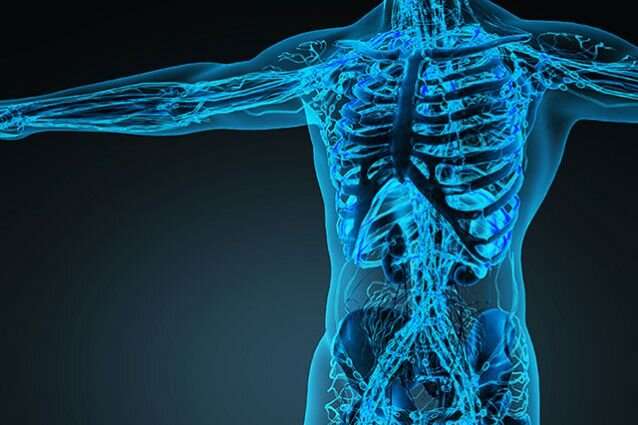Is vitamin K the secret key to bone strength?

When we think of strong bones, we usually think of milk, a rich source of the nutrients that promote bone density: calcium and vitamin D. But we may be overlooking another important nutrient created closer to home—in our own gut, to be exact.
Vitamin K produced by certain types of bacteria that colonize the gut could also bolster bones, according to scientists Kyla Shea of the Vitamin K Laboratory at the USDA's Human Nutrition Research Center on Aging (HNRCA) at Tufts University and Chris Hernandez of Cornell University's Sibley School of Mechanical and Aerospace Engineering.
Hernandez reached out to collaborate with the Vitamin K Laboratory, headed by HNRCA Director Sarah Booth, after seeing reduced bone strength but unchanged bone density in mice whose gut microbiomes had been modified (this research was published in 2017 in the Journal of Bone and Mineral Research). Combing through the bone strength literature to identify the nutrient that might have been lost, Hernandez found that vitamin K had often been associated with fracture risk, but not bone density.
"The HNRCA is the perfect place to research this question. Not only does it have the world's experts on the biochemistry of vitamin K, but it also has unique facilities that make it possible to manipulate the form of the vitamin that is involved here and to monitor the process," said Hernandez.
Most of the vitamin K in our diet comes from green vegetables, but the gut bacteria synthesize a different form of it, Shea said. It's this form of vitamin K that could be affecting bone strength, although the exact mechanism is yet to be determined.
"Many clinical trials with vitamin K measure bone mineral density outcomes, but there may be links with bone strength independent of density," Shea said. What kind of links might these be? "Vitamin K is an enzymatic cofactor that's required for certain proteins to function," Shea said. "One of these, osteocalcin, is the predominant non-collagenous protein in bone."
Osteocalcin forms a soft, string-like material inside the mineralized portion of the bone, and helps make the bone matrix as a whole less brittle, Hernandez said. "Right now, a lot of treatments for osteoporosis focus on improving bone mineral density, but there are not a lot of ways to improve bone matrix quality," he said. "What if we could change the gut microbiome so it makes more vitamin K, which could give people those benefits without having to eat more kale or take a regular vitamin supplement?"
Hernandez and Shea's most recent results were published in the journal BONE and they are applying for a grant from the National Institutes of Health to do research to confirm that vitamin K is indeed responsible for the bone changes in mice with modified microbiomes. "It's intriguing and we have a long way to go to get to that point, but if possible, it would be very cool," Shea said. "It's been a great collaboration —it's fun to work with people who are interested in vitamin K."
Hernandez predicts the collaboration will be a fruitful one. "The microbiome is an exciting new arena with a lot of potential for new treatments, and a lot of that is the interaction with nutritional components," Hernandez said. "What's going on at this center at Tufts is really going to be key to making these microbiome therapies work."



















